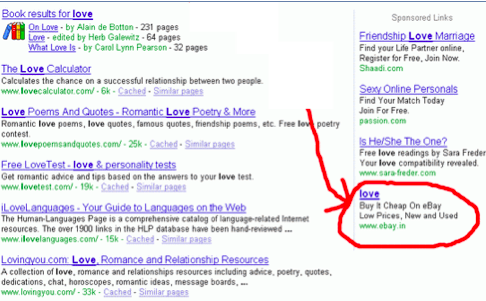Earlier this week, the Harvard Business Review blog asked, “Did eBay Just Prove that Paid Search Ads Don’t Work?” Apparently the company turned off their AdWords ads in a third of their markets and found no appreciable loss in sales. Much in the same way that Ask Jeeves did back in 2005. So the true questions; does that mean paid search doesn’t work?
In a word, no. I had to laugh at this news because eBay has always been a shining example of how not to run a PPC campaign. For years, SEM managers have snickered at their hopelessly inept use of dynamic keyword insertion, resulting in nonsensical ads suggesting you can buy babies, perpetual motion machines, and loneliness on eBay – cheap!
So, if you want to waste millions of dollars of marketing budget over a decade or so, here are four ways you too can tank your AdWords campaign and embarrass your brand!
Bid on 170 Million Keywords
I’m all for keyword expansion, but it’s possible that having 170 million keywords, as they disclose in the study, might not be the best strategy.
The whole point of keyword research is to determine a finite set of terms that:
a) are relevant to your prospects and
b) show some level of meaningful intent
Finding those targeted, relevant keywords is crucial to PPC success. Historically, eBay’s approach has been to bid on pretty much every keyword possible, with no targeting whatsoever:

This can only lead to low click-through rates, low Quality Scores, high costs per click and very low conversion rates.
Use the Same Ad Text for Every Keyword
To make matters worse, eBay for years used generic text for every ad: variations on “Buy It Cheap On eBay,” “Shop on eBay and Save,” etc. This goes against every best practice of PPC ad writing. To maximize clicks and conversions, you need to:
- Split keywords into very granular ad groups
- Write specific, tailored ads for each ad group
Using generic ad creative that would work for any imaginable keyword is a sure way to tank your results.
Use DKI Indiscriminately
Dynamic keyword insertion is an ad technique that, used properly, can improve your ad CTR by dynamically inserting the user’s exact search query into your ad. Used improperly, it just results in total nonsense:

It looks like whoever was managing eBay’s AdWords account paid no attention to the search query report and the way ads were actually rendering on the SERPs.
Don’t Use Negative Keywords
Negative keywords are Google’s way of letting you filter out traffic that wouldn’t be useful to your business. When you set a negative keyword, you’re telling Google not to display your ad for those search terms. That way, if you sell kitty litter, you won’t get a bunch of clicks from schoolgirls looking for Hello Kitty merchandise.
Based on some of the terms that eBay was showing ads for, it’s clear that they didn’t have a handle on the power of negative keywords. I estimate that advertisers who don’t use negative keywords lose up to a third of their ad spend on worthless clicks that don’t drive business. No wonder eBay has decided that AdWords doesn’t work! But the problem isn’t AdWords, it’s the way they were (mis)using it.
If I had eBay’s huge budget to work with, I promise I could make paid search work for them. How about it, John Donahoe?




![AI Overviews: We Reverse-Engineered Them So You Don't Have To [+ What You Need To Do Next]](https://www.searchenginejournal.com/wp-content/uploads/2025/04/sidebar1x-455.png)